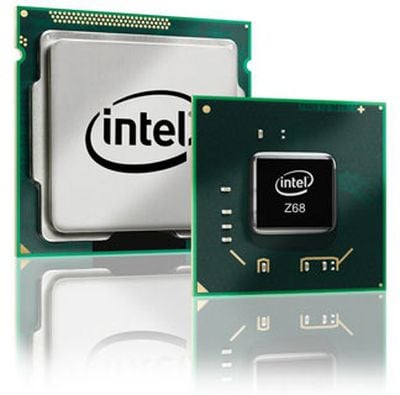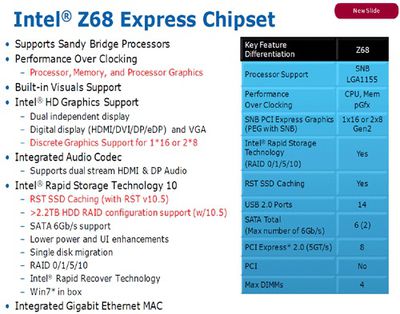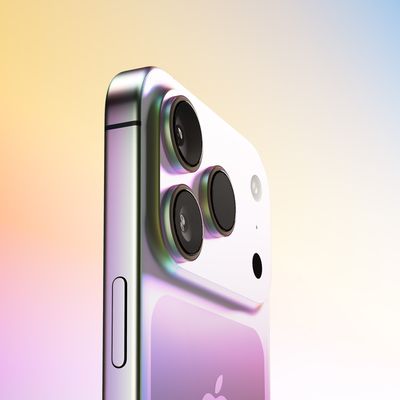Intel's Z68 Chipset to Bring SSD Caching to Sandy Bridge
VR-Zone reports (
via Hardmac) that Intel has begun production of its new "Z68" chipset for Sandy Bridge-based processors, with availability set for May. Most notably in light of rumors regarding the new MacBook Pro that failed to materialize, the Z68 chipset will support Intel's Rapid Storage Technology SSD caching.
Interestingly, Intel has also started production of their Z68 chipset this week along with other Cougar Point SKUs like H61 and Q65. All of them are based on the new B3 stepping therefore the SATA port 2-5 issue is fixed before they hit the market. Judging from the specs, it seems Intel has catered Z68 specially for enthusiasts which allows better processor overclocking, discrete graphics support and SSD caching capability.
SSD caching marries a conventional hard drive to a relatively small solid-state drive (SSD), with the most frequently-accessed data automatically placed on the SSD for fast access while the two drives appear to users simply as a single drive. The functionality serves to bring users much of the speed benefit of SSDs but with the storage capacity and lower cost of traditional hard drives.
Several rumors in the days leading up to last week's MacBook Pro refresh
claimed that the updated models would offer a dedicated SSD to host the operating system and other essential files. The claims did not, however, come to fruition.
Update: To be clear, the Z68 chipset is for desktop implementations.
Popular Stories
Apple's iPhone 17 Pro and iPhone 17 Pro Max models will feature a number of significant display, thermal, and battery improvements, according to new late-stage rumors.
According to the Weibo leaker known as "Instant Digital," the iPhone 17 Pro models will feature displays with higher brightness, making it more suitable for use in direct sunlight for prolonged periods. The iPhone 16 Pro and...
Just one week before Apple is expected to unveil the iPhone 17 series, an analyst has shared new price estimates for the devices.
Here are J.P. Morgan analyst Samik Chatterjee's price estimates for the iPhone 17 series in the United States, according to 9to5Mac:
Model
Starting Price
Model
Starting Price
Change
iPhone 16
$799
iPhone 17
...
Apple is expected to unveil the iPhone 17 series on Tuesday, September 9, and last-minute rumors about the devices continue to surface.
The latest info comes from a leaker known as Majin Bu, who has shared alleged images of Apple's Clear Case for the iPhone 17 Pro and Pro Max, or at least replicas.
Image Credit: @MajinBuOfficial
The images show three alleged changes compared to Apple's iP...
Apple will launch its new iPhone 17 series this month, and the iPhone 17 Pro models are expected to get a new design for the rear casing and the camera area. But more significant changes to the lineup are not expected until next year, when the iPhone 18 models arrive.
If you're thinking of trading in your iPhone for this year's latest, consider the following features rumored to be coming to...
An iPhone 17 announcement is a dead cert for September 2025 – Apple has already sent out invites for an "Awe dropping" event on Tuesday, September 9 at the Apple Park campus in Cupertino, California. The timing follows Apple's trend of introducing new iPhone models annually in the fall.
At the event, Apple is expected to unveil its new-generation iPhone 17, an all-new ultra-thin iPhone 17...
We're only days away from Apple's "Awe dropping" fall event scheduled to take place on Tuesday, September 9 – and along with the new iPhone 17 series, we're going to get a new version of the Apple Watch Ultra for the first time since 2023.
By the time the Ultra 3 is unveiled, it will have been two years since the previous model arrived. The intervening period has left plenty of room for...



















